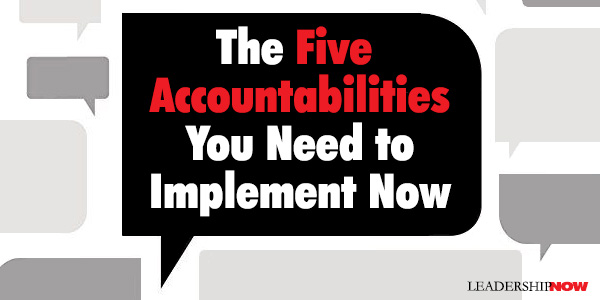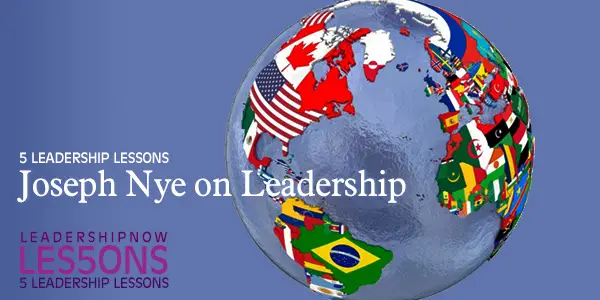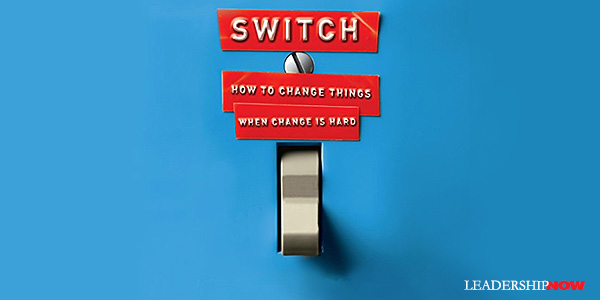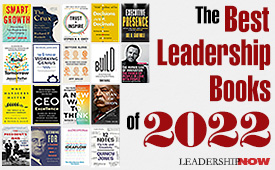 Leading Blog | Posts by Month |
 Leading Blog | Posts by Month |
07.31.10

LeadershipNow 140: July 2010 Compilation
Posted by Michael McKinney at 01:00 AM
07.29.10

Whom Do You Need to Thank? The Unsung Heroes Annie's here tonight. No doubt she walked the 50 feet from our front door in cute little Italian shoes of which we have an extensive collection. (Laughter) In Afghanistan, I once considered using Annie's shoe purchases as an argument to get Italy to send additional forces. (Laughter) But truth be known, I have no control over that part of the McChrystal economy. (Laughter)Whom do you need to thank?
Posted by Michael McKinney at 02:10 PM
07.27.10

7 Signs You Might Be In Denial
Nothing is easier than self-deception. For what each man wishes, that he also believes to be true.BUSINESS historian Richard S. Tedlow, shares in Denial examples of CEOs who have made mistakes that could and should have been avoided and those that did it right and why. The lessons Tedlow uncovers in these examples provide us with insight into our own flirtation with denial and how we might battle it. You might be in denial if you think you have all of the information you need. “Power deranges. Powerful people are routinely surrounded by yes-men, but that is not the real problem because they are relatively easy to spot. The real problem is the courtier who is sufficiently clever not to be detected.” Powerful people, Tedlow continues, “don’t really know as much as they may think about their own organization because people stop telling them the truth.” You might be in denial if you don’t make a point to listen. If people think they won’t be heard they will not speak up. You need to create an open environment where it is safe to say what’s on your mind. Tedlow offers a quick test of your environment: “are the private conversations that follow meetings usually more frank and honest then the public discussions in the meetings themselves?” If so, it’s because everybody is talking about what didn’t (couldn’t) get said. You might be in denial if you think short-term. You are sticking your head in the sand. Trying to put a Band-Aid on a much larger problem only delays your response to the inevitable. Deal with it now and completely. “Denial is all about you—and how you view the world. Your view does not change the world, the realities of which you will inevitably have to face sooner or later.” You might be in denial if you talk trash about competitors and individuals. Anna Freud called it “defense by means of ridicule and scorn.” Tedlow writes, “If you find yourself trash-talking your competition take a moment to think about what you’re doing. What am I using this derision to hide—perhaps from myself?” You might be in denial if you relabel actions rather than changing them. When you don’t like reality, you just change its name. The result as George Orwell said is to “perform the important service of partially concealing your meaning even from yourself.” “Troubled assets aren’t ‘troubled assets.’ They are worthless pieces of junk.” You might be in denial if you don’t tell the truth. “Denial occurs when we push aside hard truths in favor of more palatable or convenient narratives.” This works two ways: the lies we tell and the lies others tell us. Don’t participate in either. You might be in denial if you don’t think denial is a problem you face. That of itself is denial. Tedlow cautions, “It can never be completely defeated because we can’t fully know or face the truth about ourselves. It is impossible to be both subject and object.” You need to develop a self-awareness about it. “Denial-avoidance is a life’s work, not an agenda item….If one could simply resolve to wake up tomorrow and unflinchingly confront reality, denial would hardly be the problem that it is….You can’t avoid blind spots when you drive. However, good drivers know those blind spots exist and take them into account when they get behind the wheel. So it should be with denial.” Some people deny less than others. How can you be one of them? 
Posted by Michael McKinney at 11:16 PM
07.23.10

The Five Accountabilities You Need to Implement Now No More Excuses by Sam Silverstein is about expanding your accountability zone. To do that it means “reaching the point in your life where you can say, ‘No More Excuses! I’m not going to make excuses, and I’m not going to buy excuses.’” Excuses only legitimize the past, ignore the present, and eliminate the future.
No More Excuses by Sam Silverstein is about expanding your accountability zone. To do that it means “reaching the point in your life where you can say, ‘No More Excuses! I’m not going to make excuses, and I’m not going to buy excuses.’” Excuses only legitimize the past, ignore the present, and eliminate the future.
Silverstein’s book is built around The Five Accountabilities he has developed to help you—in a practical way—to move beyond the excuse; to make accountability a way of life for you personally and part of your organization’s culture. The five accountabilities are: Doing the Right Things. Begin by identifying your strategic intent. What are you trying to accomplish and by when? We are accountable for understanding and identifying our strategic intent—and the activities that support it. Mt. Everest climber Ronnie Muhl, told Sam: “You get into the habit of asking yourself, ‘If my life depended on the next action I took, how differently would I perform that action?’ —because doing the wrong thing can have massive consequences.” Managing Your Space. We are accountable to create the new space we need to grow and innovate in our own lives, which sometimes means taking space from something else that we’re doing. “Force of habit prevents us from giving ourselves the physical, mental, financial, or emotional space necessary to shake things up a little bit and put something new in our lives—something that could provide growth and improvement.” David Silverstein, CEO of the Breakthrough Management Group International, told Sam, “You have to be willing to cannibalize your own business in order to grow.” Managing the Process. We are accountable for creatively making progress toward whatever it is we are trying to make happen even when we hit an obstacle. It means not throwing up our hands and saying, “If it’s not meant to be, it’s not meant to be.” Kenneth Evans, Dean of Price College of Business at the University of Oklahoma told Sam, “The real problem with the way that some people look at accountability is that oftentimes it’s layered into a notion of a rigid set of expectations and performance parameters, and frankly, you can get into very deep trouble if that’s your mantra. How you react to changing events is important as well.” Establishing the Right Expectations. We are accountable for establishing the right expectations, that reflect our values, that are properly benchmarked, and are a bit of a stretch. Clothier Elim Chew, spoke to Sam about the leading from where you are at his company 77th Street, “The people who accept responsibility for, say, 10 things that are part of their job description and then accept personal accountability for five more things all on their own are the ones who are more likely to get the bigger bonuses and bigger raises in this company. They’re the ones who may end up running a business of their own someday.” Contributing to Your Relationships. The success or failure of our relationships depends entirely on the contributions we make. We are accountable for giving to our relationships—without keeping track. “In fact, the quickest way to kill a relationship is to start keeping track of all the reasons it’s not your turn to give to it and support it.” Sam adds, “We should constantly be looking for ways to invest in the relationship and enhance the value of the relationship over time.” Sam says, “Building relationships is about choices, and the choices should always be based on your values. To get a fix on your values, ask yourself: How can I best serve this relationship in the short term and the long term?” Brian Martin, CEO and founder of Brand Connections, talked to Sam about managing emotions. He said, “I have asked every single person I’ve hired two questions: ‘First, what is most important for you to feel professionally, every day? And second, what’s most important for you to avoid feeling? What would you really rather not go through, not have to replay with your spouse at the end of the day, when that person asks how your day went?’ I keep the answers on file, and I look at those answers every week when I do my own planning.” More information can be found at SamSilverstein.com to help you implement the Five Accountabilities. “If you want to build an organization that achieves its goals and beats the competition, it’s time for No More Excuses.” 
Posted by Michael McKinney at 06:56 PM
07.22.10

No Excuses!“I don't know anyone who could get through the day without two or three juicy rationalizations.”We like (need) to rationalize. We often feel compelled to create acceptable reasons for otherwise unacceptable behavior. You know … excuses. We all have made excuses and can easily get into the habit of making excuses. Excuses are insidious things that get in the way of moving forward. Eliminate them. Brian Tracy, a man who needs no introduction, says the way out of the morass created by excuses is self-discipline. Elbert Hubbard defines self-discipline as the ability to do what you should do, when you should do it, whether you feel like it or not. No Excuses! is a primer on self-discipline and full of those kinds of things that will make you reconsider the habits you have gotten into. Tracy cites Kop Kopmeyer: “There are 999 other success principles that I have found in my reading and experience, but without self-discipline, none of them work. With self-discipline they all work.” Tracy examines how the practice of self-discipline impacts twenty-one areas of your personal, business, sales and financial life such as character development, goal setting, leadership, health and family. The pull to take the path of least resistance and to do what is expedient, says Tracy is our worst enemy. Looking only to the short-term “most people do what is expedient, what is fun and easy rather than what is necessary for success.” In a personal example, Tracy recalls at age 21 that it dawned on him that “this is my life. This was not a rehearsal for something else. The game was on, and I was the main character, as in a play.” That realization changed his life and he resolved to take more responsibility for his life and take a “no excuses” approach to every aspect of his life. “In its simplest form,” says Tracy, “the role of the leader is to take responsibility for results.” This involves developing a vision for yourself and for your areas of responsibility. [As an aside to the vision thing, on Twitter today, Tom Peters said that maybe it’s just semantics but, “Don’t especially like vision. Prefer portrait. E.g.: ‘Leaders paint portraits of Excellence.’” Phil Gerbyshak filled in some of the details of Tom’s thought by stating that he thinks “leaders provide the outline for excellence and allow others to fill in the colors and add details/meaning.” Good food for thought. Does portrait put a face on it—responsibility?] Continuing on, Tracy says that leaders must take the responsibility to be role models and set the example. “There is a direct relationship between your ability to discipline yourself and your behaviors and your readiness to lead.” The bottom-line of self-discipline is peace of mind. Peace of mind because you consistently do what needs to be done and have developed the self-discipline needed to let go of the negative events that happen to you—forgive and forget—and focus your energy instead on taking responsibility and moving forward. “Discipline yourself to stop justifying your negative emotions by continually rehashing what happened and what the other person did or didn’t do.” Tracy adds, “Your ability to achieve your own peace of mind is the true measure of your success and the key determinant of your happiness.” There are a thousand excuses for failure but never a good reason. Of Related Interest:
Posted by Michael McKinney at 01:46 PM
07.16.10

5 Leadership Lessons: Joseph Nye on Leadership
JOSEPH S. NYE is University Distinguished Service Professor at Harvard University's Kennedy School of Government. In The Powers to Lead, he relates leadership and power. He expands further on his concept of soft power—co-opting people rather than coercing them—and hard power—influence involving pressure or threats—but he shows how effective leadership in the real world requires a mixture of both. Hard and soft power are related because they are both aspects of the ability to achieve one’s purpose by affecting the behavior of others. They sometimes reinforce each other and sometimes they interfere with each other. The use of either one or the other depends on context. The ability to know which to use when is what he calls smart power. We need to know our context. He says, “Soft power is not good per se, and it is not always better than hard power. Nobody likes to feel manipulated, even by soft power. Like any form of power, it can be wielded for good or bad purposes, and these often vary with the eye of the beholder.” Here are five leadership lessons from The Powers to Lead:

Posted by Michael McKinney at 06:35 PM
07.14.10

Switch: How to Change Things When Change is Hard
IT IS NOT unusual for organizations (individuals) to fall short of the outcomes to which they aspired within the time allotted for that change. The biggest obstacle is getting people at all levels committed to the change. Commitment requires both hearts and minds. The problem is hearts and minds often have different agendas. “Logic only gives a man what he needs,” wrote Tom Robbins, “magic gives him what he wants.” Logic tells what we know to do; emotion is the magic that explains why we do what we do. Logic may direct, but emotion runs the show. Logic says what needs to be done. Emotion gets it done. The brothers Heath—Chip and Dan—explain in Switch why we must and how we get hearts and minds—emotion and logic—to work together.  It seems like the Elephant may be all bad: lazy, skittish, and seeks instant gratification over long-term gain. “Changes often fail because the Rider simply can’t keep the Elephant on the road long enough to reach the destination.” But the Rider has issues too: overanalyzing and over-thinking things, the tendency towards a problem-focus instead of a solution-focus, and the proclivity to complain than praise. We have to learn to deal with both. As leaders, we need to speak to both the Rider and the Elephant. They begin by illuminating three key observations about change that lead us to three things we must do to make change happen: First, what looks like a problem is often a situation problem. We often overlook the situational forces that shape our and other people’s behavior. There are things we can do to make the change easier and remove some of the friction. We can shape the Path. When it comes to changing behaviors, “environmental tweaks beat self-control every time.” Second, what looks like laziness is often exhaustion. Self-control is an exhaustible resource. They explain, “When people try to change things, they’re usually tinkering with behaviors that have become automatic, and changing those behaviors requires careful supervision by the Rider. The bigger the change you’re suggesting, the more it will sap people’s self-control. And when people exhaust their self-control, what they’re exhausting are the mental muscles needed to think creatively, to focus, to inhibit their impulses, and to persist in the face of frustration or failure. In other words, they’re exhausting precisely the mental muscles needed to make be change.” We need to motivate the Elephant. Third, what looks like resistance is often a lack of clarity. The Rider is “a navel-gazer, an analyzer, a wheel-spinner. If the Rider isn’t sure exactly what direction to go, he tends to lead the Elephant in circles.” Often we state outcomes with little mention of what exactly you want people to do. What exactly does that outcome mean in terms of what I should do now? What do you want me to do this minute? Speak to the solution. We need to direct the Rider. Trying to understand why people don’t change or aren’t supporting your change isn’t always easy. “Is it because they don’t understand or because they’re not enthused? Do you need an Elephant appeal or a Rider appeal?” “Trying to fight inertia and indifference with analytical arguments is like tossing a fire extinguisher to someone who’s drowning. The solution doesn’t match the problem.” The brothers Heath uncover methods and thinking to help you to direct the Rider, Motivate the Elephant and Shape the Path. Their memorable examples and research findings clearly illuminate the methodology. The insights will resonate with you and hopefully change your approach to change and make it easier. Switch is an important [required] book for anyone wanting to understand change and constructively deal with the issues we confront when staring down the need to make a change. Read it, grow, and deliver. 
Posted by Michael McKinney at 11:06 AM
07.07.10

How Many Surface Areas Do You Have? HOW MANY points of contact do you have with the world around you? If we limit ourselves to one area or experience, then we limit our exposure and growth. If we depend too much on one facet of our lives, we isolate ourselves from the world around us and we end up missing what is really going on.
HOW MANY points of contact do you have with the world around you? If we limit ourselves to one area or experience, then we limit our exposure and growth. If we depend too much on one facet of our lives, we isolate ourselves from the world around us and we end up missing what is really going on.
In The Power of Pull the authors share their conversation with entrepreneur Jack Hidary. He explains that people overlook obvious situations because they “paint themselves into a corner such that their entire interaction with the outside world is mediated through this one facet. Then they’re unable to critically analyze where they are. That’s how they end up going down with the ship.” This is important because as authors John Hagel III, John Seely Brown, and Lang Davison point out, “If we are going to succeed in this rapidly changing world, we face two challenges: making sense of the changes around us, and making progress in an increasingly unfamiliar world.” To do this we need to approach what we do in a way that allows us to be in the flow of knowledge and open to serendipitous events that inform us of things we didn’t know and didn’t even know we were looking for. That approach they call pull: the ability to draw out people and resources to address opportunities and challenges. It’s different than push. Push predetermines our needs and then creates systems and standardized processes designed to provide what we need when we need it. It says, “I know better than you. Do this, not that.” It says, “I know. Here’s what you do.” On the other hand, pull says, “I don’t know. I’ll seek.” The pull approach works to help us to find and access people and resources when we need them, the ability to attract people and resources that are relevant and valuable and then to pull from ourselves the insight and performance required to achieve our potential. The attract aspect of pull is critical. In a world that is changing so quickly, we often don’t even know what we are looking for or the questions to ask to get there. It calls for a different approach. It increasingly depends upon serendipity. You need to increase your surface areas. You need to look for ways to pull people and their knowledge toward you. “If you want to find out what it is you don’t know that you don’t know, you need to hang out with other people who might already know it.” We need serendipitous encounters with people because of the importance of the ideas that these people carry with them and the connections they have. People carry tacit knowledge. … You’ve got to stand next to someone who already knows and learn by doing. Tacit knowledge exists only in people’s heads. As edges arise ever more quickly, all of us must not only find the people who carry the new knowledge but get to know them well enough (and provide them with sufficient reciprocal value) that they’re comfortable trying to share it with us. The authors claim that serendipity in certain respects can be shaped. Of course luck is involved, but we can materially affect it by our actions. We need amplifiers and filters. Amplifiers “that can help us reach and connect to large groups of people around the globe that we do not know.” Filters “that can help us to increase the quality as well as the number of unexpected encounters and ensuing relationships that are truly the most relevant and valuable.” We can manage serendipity by:
The authors ask: What are the five places in the world that would offer the richest opportunities for serendipitous encounters with people who share your passions and interests? What actions could you take to increase the likelihood and quality of serendipitous encounters in the online social networks you participate in? Of the people you met serendipitously in any venue over the past year, how many of these people have you actually engaged in some joint initiative related to your passions and interests? 
Posted by Michael McKinney at 08:58 AM
07.06.10

Leading Views: Are You Relevant? Joe Calloway, Chuck Feltz and Kris Young believe that leadership and success will always be intentional and never by chance. In a time when we are required to do more with less, we need to be able to draw the value out of existing resources. One crucial way of doing that is to be relevant. In Never by Chance they write that businesses lose their relevance every day. If you don’t have a clear definition of what relevance means to your business you’ll never see it coming. Joe Calloway writes: Joe Calloway, Chuck Feltz and Kris Young believe that leadership and success will always be intentional and never by chance. In a time when we are required to do more with less, we need to be able to draw the value out of existing resources. One crucial way of doing that is to be relevant. In Never by Chance they write that businesses lose their relevance every day. If you don’t have a clear definition of what relevance means to your business you’ll never see it coming. Joe Calloway writes:
As a leader, relevance is one of lenses through which you should use to make every decision, every single day. Does this decision advance the vision and fit our culture? Does this decision make us more relevant to our customers? The question of relevance is especially vital from a competitive standpoint. You compete to the extent that you are relevant to your customers, and you differentiate to the extent that you are more relevant than your competition. So how do you find out how to be relevant to your customers? It’s simple: You ask them. Your methods can range from formal market research, to having conversations, to simply paying attention. If you own a coffee shop, are you asking your customers what newspaper they would prefer? If you own an industrial supply business, are you asking your customers what they need in terms of material and delivery? Every employee—not just management—should be asking questions, having conversations, and looking for clues with every customer interaction they have. Part of your culture should be your constant attempt to be more relevant to customers.
Posted by Michael McKinney at 08:22 AM
07.01.10

First Look: Leadership Books for July 2010Here's a look at some of the best leadership books to be released in July.




For bulk orders call 1-800-423-8273  Build your leadership library with these specials on over 160 titles. All titles are at least 40% off the list price and are available only in limited quantities.
Posted by Michael McKinney at 08:18 AM
|
BUILD YOUR KNOWLEDGE


How to Do Your Start-Up Right STRAIGHT TALK FOR START-UPS 
Grow Your Leadership Skills NEW AND UPCOMING LEADERSHIP BOOKS 
Leadership Minute BITE-SIZE CONCEPTS YOU CAN CHEW ON 
Classic Leadership Books BOOKS TO READ BEFORE YOU LEAD |
|